Overview
CRM software is an essential tool for freelancers, facilitating efficient management of customer interactions, automating administrative tasks, and boosting overall productivity. Freelancers often face challenges in managing client relationships and administrative burdens. By centralizing client data and streamlining processes, CRM systems like Kulud address these concerns effectively. This means that not only do they save time, but they also enhance client relationships, making them indispensable for independent professionals striving to grow their businesses in a competitive landscape.
It is crucial for freelancers to consider how such tools can transform their operations. By adopting a CRM system, they can focus more on their core work and less on administrative tasks. The benefits of using CRM software are clear:
- Improved efficiency
- Better client engagement
- A more organized approach to managing business relationships
Therefore, it is highly encouraged for freelancers to explore CRM solutions that can elevate their business practices.
Introduction
In an increasingly competitive freelance landscape, the importance of effective client management tools is more critical than ever. Freelancers often grapple with the challenge of managing multiple clients and projects efficiently. Customer Relationship Management (CRM) systems have emerged as essential assets, enabling freelancers to streamline workflows, enhance communication, and ultimately boost profitability.
As the freelance economy expands, millions of individuals are discovering how CRM technology transforms their operations. This means automating administrative tasks and centralizing client data, allowing freelancers to focus on their core work while fostering stronger client relationships.
The benefits of CRM systems are profound, and this article delves into their significance for freelancers, exploring key functions, benefits, and best practices for implementation in 2025 and beyond.
What is CRM? A Comprehensive Definition
CRM meaning software is an essential technology and strategy that enables businesses to effectively handle their interactions with both current and potential customers. It encompasses a suite of tools and practices aimed at streamlining processes, enhancing customer service, and ultimately boosting profitability. For independent workers, CRM systems serve as a centralized hub for customer information, allowing them to monitor interactions and automate administrative tasks.
This functionality is crucial in the freelance landscape, where juggling multiple clients and projects can quickly become overwhelming. In 2025, the importance of CRM technology for independent workers is underscored by its capacity to enable improved organization and communication. By automating routine tasks with CRM meaning software, independent workers can devote more time to their core work, thereby increasing productivity and revenue potential. Expert opinions emphasize that effective CRM strategies are crucial for independent professionals who aim to scale their businesses and achieve their professional goals.
As Naveen Kumar, a data and statistical expert, notes, "Attention to detail ensures that content remains accurate and relevant, offering valuable guidance for professionals seeking data-backed information."
Statistics reveal that only 18% of users perceive mobile CRM as having minimal or no impact, indicating a growing recognition of the technology's value. Furthermore, businesses investing in CRM technology can anticipate an impressive average return of $8.71 for every dollar spent, a notable increase from $5.60 since 2011. This trend illustrates the increasing efficiency and effectiveness of CRM systems, specifically the CRM meaning software, in managing customer relationships, which is especially advantageous for independent workers aiming to enhance their operations.
Real-world examples illustrate how independent workers are leveraging CRM strategies to enhance their operations. For instance, demographic data shows that approximately 52% of Gen Z and 44% of millennials are engaged in freelance work, with millennials constituting 45% of the total freelance population. This younger demographic is increasingly adopting CRM technology to streamline their workflows and enhance customer engagement.
Current trends in CRM meaning software adoption among freelancers in 2025 indicate a shift towards more user-friendly and automated solutions, allowing for seamless integration with existing tools and platforms. Kulud's automation features, such as logging in with your business email, capturing invoices and receipts, matching bank transactions, and easy accounting exports, can complement CRM strategies by simplifying expense management and enhancing communication with customers. User testimonials highlight the effectiveness of Kulud in saving time and streamlining processes; for example, Georgi Knyazhev, a freelancer, states, "Instead of spending 3 hours each month searching for and collecting invoices for my companies in Estonia, I now spend just 5 minutes. It's a huge time saver."
As the freelance market continues to evolve, the significance of CRM meaning software in nurturing strong customer relationships and driving business growth cannot be overstated. Consider how these tools could transform your workflow and enhance your client interactions—try implementing a CRM solution today to experience the benefits firsthand.
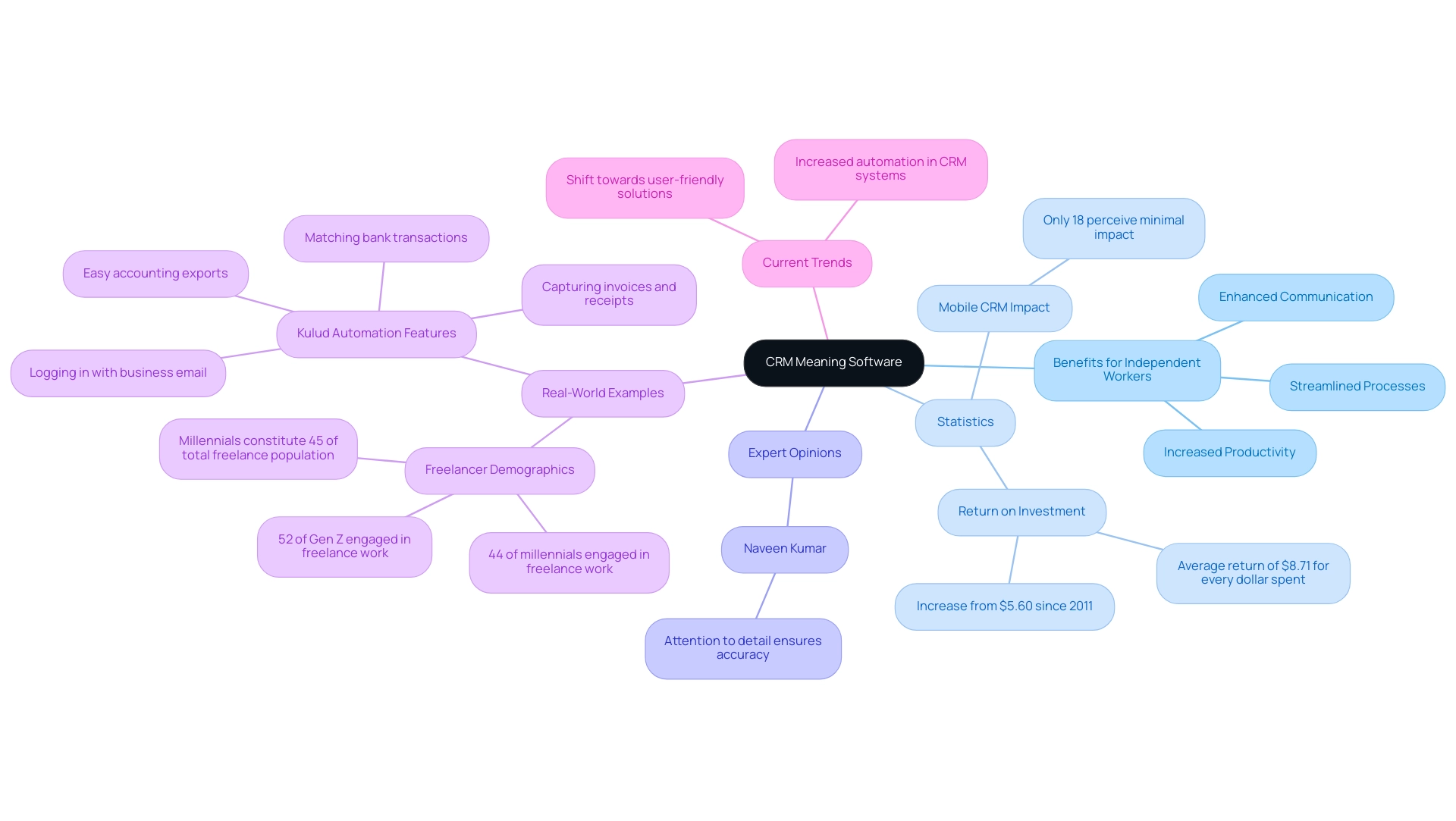
Key Functions of CRM Software for Freelancers
The CRM software tailored for independent professionals addresses common concerns about expense management by encompassing a range of essential features, including contact management, task automation, email tracking, and sales pipeline management. These functionalities enable independent professionals to efficiently organize customer information, schedule follow-ups, and monitor project progress, ultimately enhancing productivity and customer satisfaction.
For instance, platforms like HubSpot CRM and Zoho CRM are renowned for their intuitive interfaces, allowing independent professionals to manage customer interactions with ease. Task automation is particularly advantageous, as it streamlines repetitive processes, enabling independent workers to concentrate on their core activities rather than administrative duties. In fact, businesses that implement CRM software can anticipate a revenue increase of at least 30%, driven by improved sales processes and heightened customer satisfaction.
Furthermore, many CRM systems offer seamless integration with other essential tools, such as accounting software, providing independent workers with a holistic view of their client relationships and financial data. This integration is crucial in 2025, as the global CRM market is projected to exceed $80 billion, fueled by ongoing digital transformation and a shift towards customer-centric business models. Platforms like Kulud exemplify this trend by automating expense management, allowing independent workers to save time and streamline communication with their accountants.
Kulud enables users to log in with their business email, capture invoices and receipts, and match them with bank transactions automatically. Additionally, Kulud simplifies the process of exporting data for VAT or annual reports, making it easier for independent workers to manage their financial obligations. As Georgi Knyazhev noted, Kulud has had a transformative impact on accounting processes, enabling users to focus on their business growth while ensuring data security through advanced encryption and compliance with industry standards, validated by a completed Cloud Application Security Assessment (CASA) by Google and the App Defense Alliance (ADA).
A notable case study is the implementation of Pipedrive by Gray Matters, a consultancy that transitioned from inefficient spreadsheets to a custom CRM solution. This shift resulted in a remarkable 30% increase in conversion rates over 18 months, showcasing the effectiveness of tailored CRM solutions in enhancing sales processes. In addition to these features, expert insights indicate that mobile CRM usage significantly improves the quality of CRM data, with 53% of surveyed salespeople affirming its positive impact. As independent workers increasingly seek tools that enhance their operational efficiency, the demand for software that embodies the CRM meaning with robust task automation and integration capabilities, such as those offered by Kulud, will continue to grow, making it an indispensable asset for managing customer relationships in 2025.
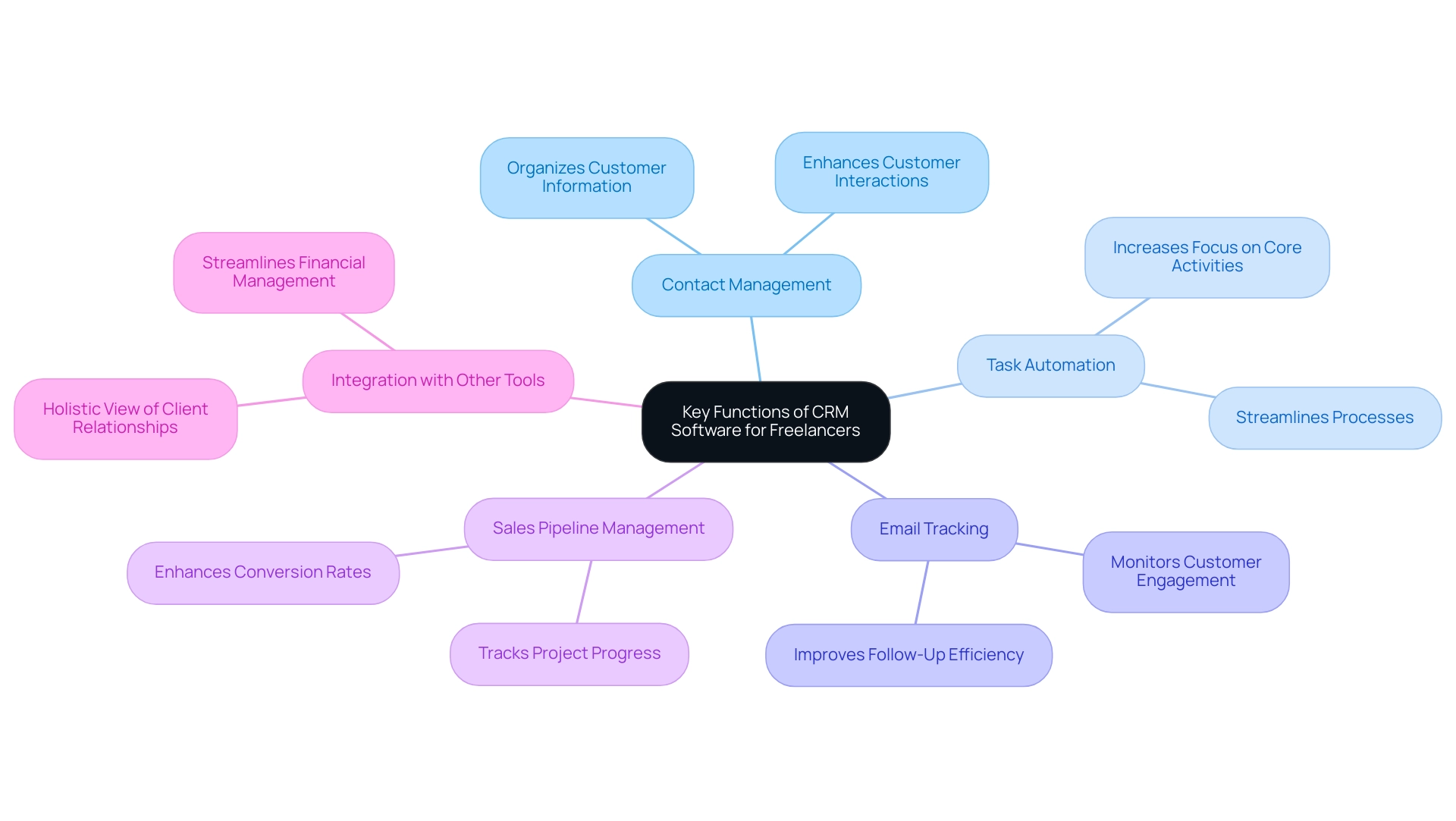
Benefits of CRM for Freelancers: Streamlining Client Management
The adoption of CRM software provides various benefits for independent workers, significantly enhancing organization, communication, and overall efficiency. By centralizing client data, freelancers gain immediate access to essential information, minimizing the time spent searching through emails or documents. In 2025, the freelance platform market is anticipated to achieve $16.89 billion, underscoring the growing reliance on efficient management tools such as CRM software.
Furthermore, CRM systems automate repetitive tasks, including sending follow-up reminders and managing invoicing, which can lead to substantial time savings. For instance, users of platforms like ClickUp have reported that CRM tools have transformed their management processes, allowing them to focus on delivering high-quality work instead of becoming bogged down by administrative duties. This shift not only boosts productivity but also strengthens client relationships, enabling independent workers to respond more promptly and effectively to client needs.
Kulud exemplifies how centralizing financial data and automating monotonous tasks can empower independent workers to manage their finances effectively, aligning with the advantages of CRM tools. Users such as Georgi Knyazhev, a freelancer, have noted that rather than spending three hours each month searching for and collecting invoices, they now spend just five minutes, showcasing a significant time-saving advantage. John Peterson, a Senior Accountant at Bolt, describes Kulud as a game-changer for accounting teams, making invoice retrieval effortless and enhancing communication with business owners.
In addition, Kulud features automated categorization and receipt extraction, which further streamline the bookkeeping process. This automation allows freelancers to concentrate on their core work rather than administrative tasks, thereby enhancing overall efficiency.
Real-life examples illustrate the transformative power of CRM software tools. Freelancers who have adopted these tools often discover that their organizational capabilities improve dramatically, similar to the benefits provided by CRM software, enabling them to manage multiple projects and customers with ease. As Jan Džemesjuk, a Creative Producer and Freelancer, observes, Kulud has simplified the bookkeeping process, making it less confusing and more manageable.
Additionally, Kulud has successfully completed a Cloud Application Security Assessment (CASA) and has been validated by the App Defense Alliance (ADA). This assessment ensures that Kulud meets high security standards, offering peace of mind for users concerned about data safety.
As Naveen Kumar, a data and statistical expert, emphasizes, "Attention to detail ensures that content remains accurate and relevant, offering valuable guidance for professionals seeking data-backed information." This insight is particularly pertinent for independent professionals aiming to utilize CRM tools effectively.
In summary, the advantages of CRM software for independent professionals in 2025 are clear: better organization, improved client management, and considerable time savings. By leveraging these frameworks, particularly through solutions like Kulud, independent workers can optimize their operations, ultimately leading to greater success in their enterprises.
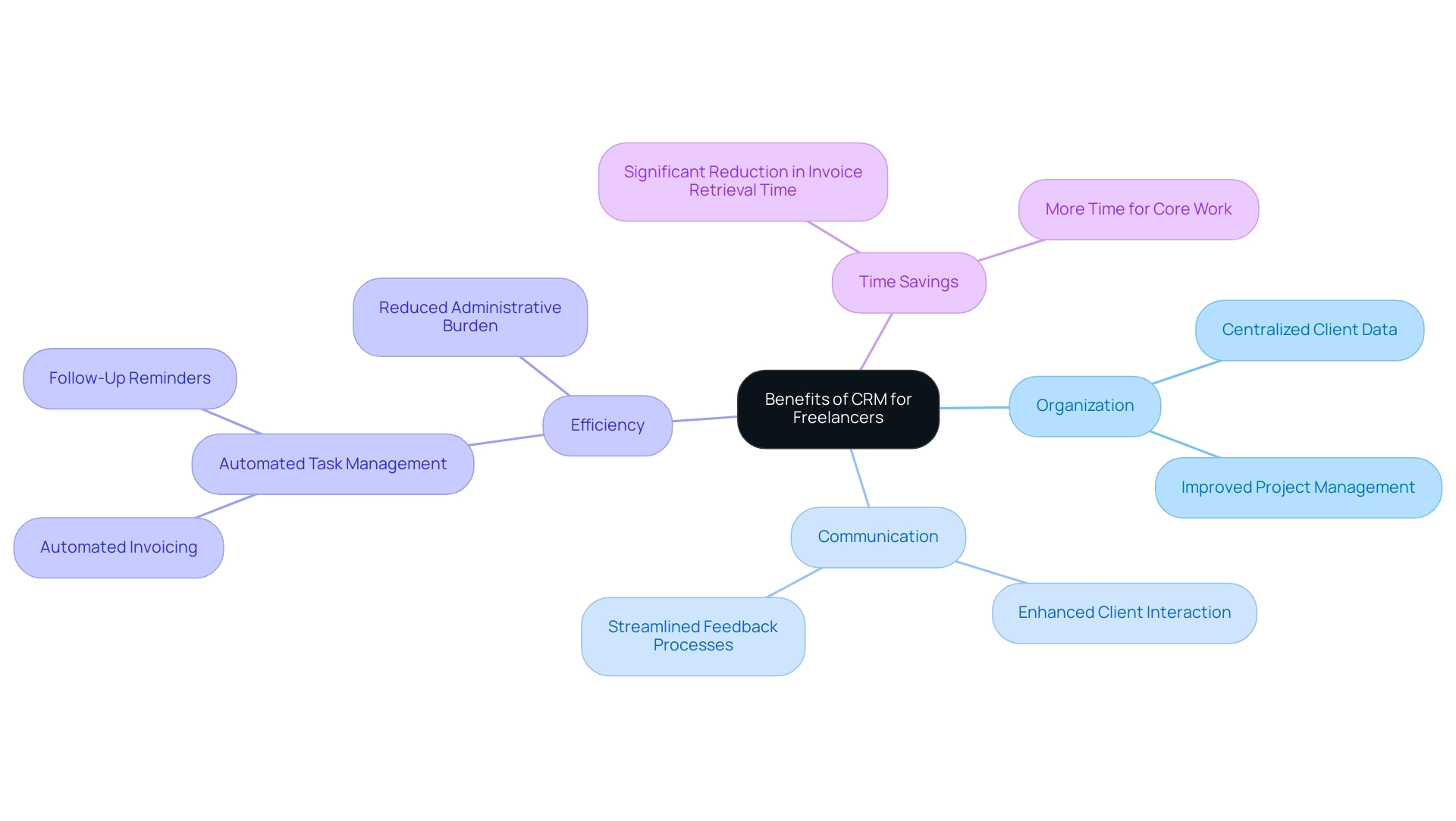
Exploring Different Types of CRM Systems: Which One is Right for You?
Freelancers often face concerns regarding the management of expenses, particularly when it comes to selecting the right CRM software. Understanding these challenges, it is crucial to explore the three main types of CRM platforms available: operational, analytical, and collaborative, each serving distinct purposes.
-
Operational CRMs focus on automating and enhancing customer-facing processes, such as sales and marketing. They optimize workflows, enabling independent workers to manage customer interactions more effectively and concentrate on income-generating tasks. Advanced CRM options can exceed $100 per user for additional features, making it essential for freelancers to consider their budget when selecting a platform.
-
Analytical CRMs analyze customer data, providing insights that inform decision-making and strategy development. By examining trends and behaviors, freelancers can tailor their services to better meet customer needs, ultimately driving growth. As Georgi Knyazhev noted, "Kulud has transformed my accounting processes, allowing me to save time and streamline communication with my accountants," underscoring the efficiency that CRM systems can deliver.
-
Collaborative CRMs prioritize communication and teamwork across various departments, ensuring that all team members are aligned in their approach to client management. This is particularly beneficial for independent workers who may collaborate with other professionals or agencies.
In 2025, independent workers must carefully assess their specific needs when choosing CRM software as their solution. For instance, those who prioritize automation might lean towards operational CRMs, while those focused on data-driven strategies may find analytical CRMs more advantageous. Statistics indicate that operational CRMs are gaining popularity among independent workers, with a substantial portion utilizing these tools to enhance efficiency.
Notable CRM solutions suitable for independent workers include Pipedrive, which integrates marketing, sales, and customer support functionalities, and Teamwork, which offers project management capabilities alongside CRM features. Furthermore, there are approximately 381 different varieties of CRM software available, including Apptivo and Streak CRM, each catering to diverse business needs. As the CRM software landscape continues to evolve, independent workers should remain informed about the various options at their disposal, ensuring they select a system that aligns with their business goals and operational requirements.
Pricing for ActiveCampaign starts at $15 per month for independent workers, providing an affordable option in the market.
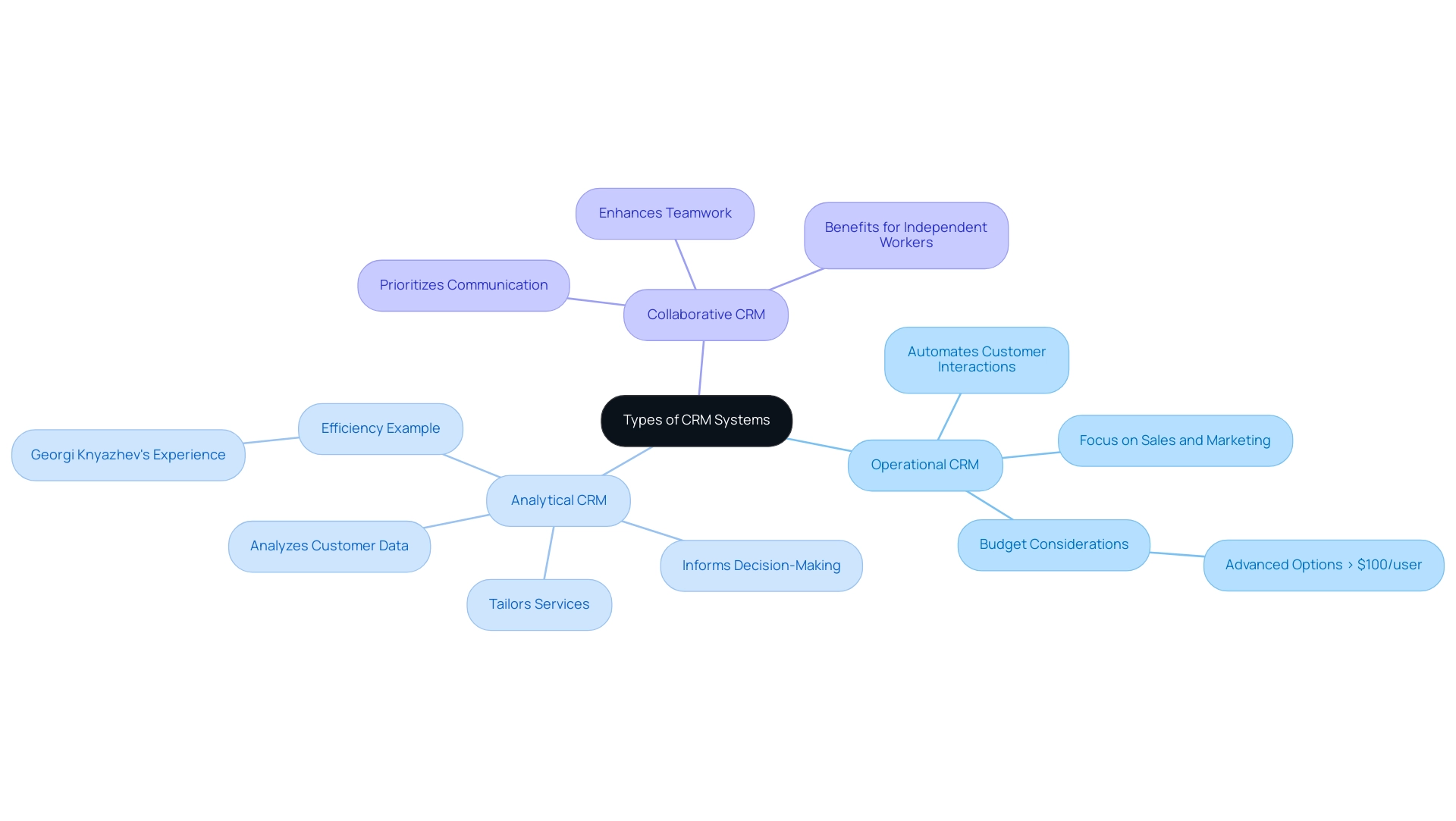
Best Practices for Implementing CRM Software in Your Freelance Business
To effectively implement CRM meaning software, independent contractors should begin by clearly defining their objectives and identifying the specific features that will best serve their needs. Selecting a user-friendly CRM that seamlessly integrates with their existing workflow is essential for maximizing efficiency. Furthermore, training plays a pivotal role in this process; independent workers should dedicate time to mastering the framework to leverage its full potential.
Consistently reviewing and updating customer data is vital to maintaining the CRM's relevance and effectiveness as a valuable tool.
Integrating the CRM meaning software with other essential tools, such as email and accounting software, can significantly enhance its functionality and streamline operations. For instance, successful freelancers have reported improved interactions with customers and greater productivity by utilizing CRM tools that offer customizable sales pipelines and automation features. In fact, a study found that 85% of users of CRM meaning software in the US identified better customer experience as the primary benefit of using such systems. This statistic underscores the importance of CRM meaning software in enhancing client interactions.
Moreover, testimonials from satisfied customers, such as Georgi Knyazhev, highlight the transformative impact of effective CRM meaning software implementation on their business processes. By adopting these best practices, independent professionals can ensure that their CRM implementation not only meets their immediate needs but also supports their long-term business growth. Additionally, it is important to note that CRM systems have undergone rigorous assessments to ensure user data confidentiality and protection, addressing any concerns individuals may have regarding data security.
By utilizing CRM analytics, independent professionals can improve consumer satisfaction and cultivate stronger connections with those they serve.
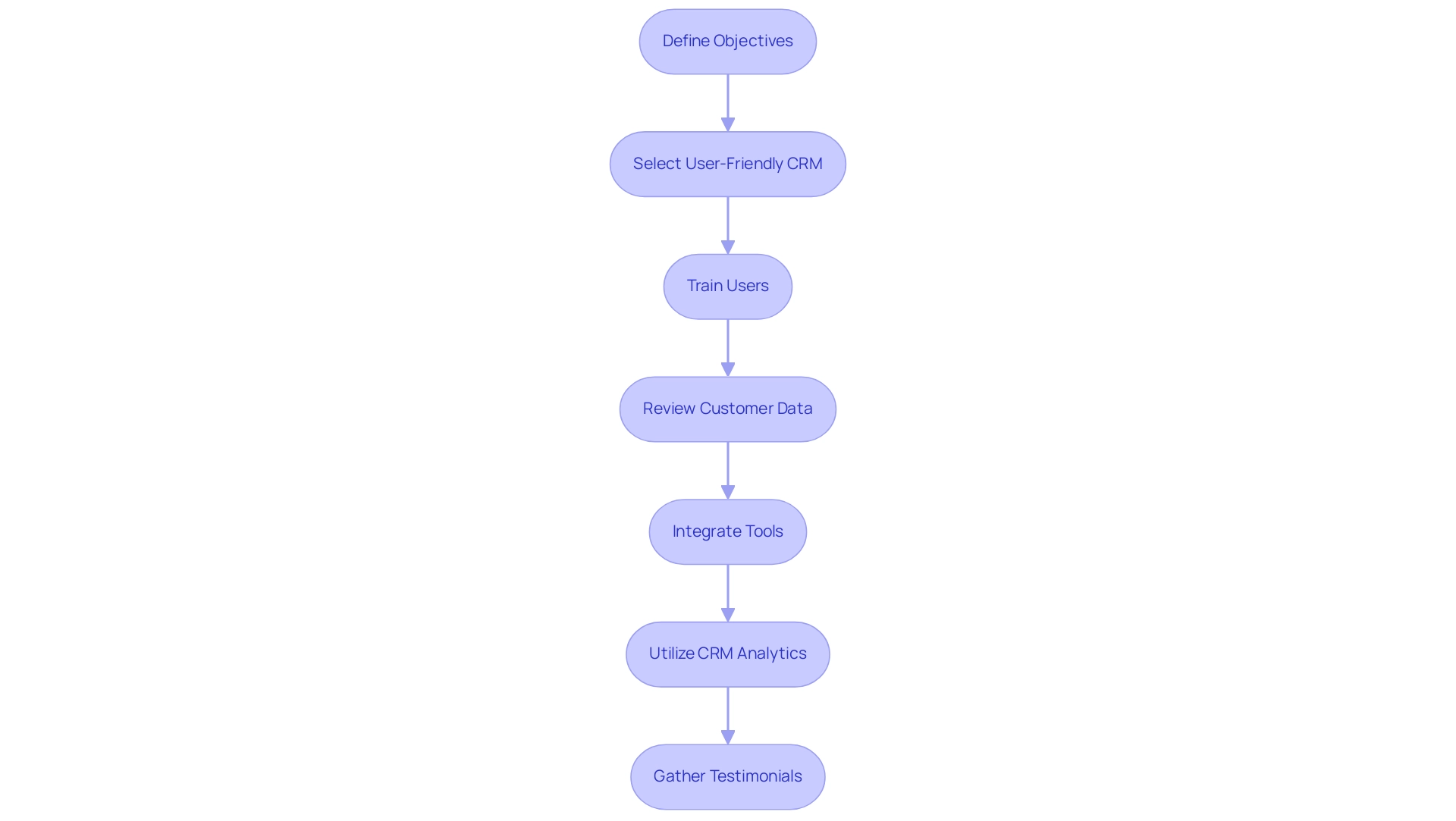
Overcoming Common Client Management Challenges with CRM
Freelancers frequently grapple with a range of management challenges, including juggling multiple communications, tracking project deadlines, and ensuring timely follow-ups. In 2025, these issues have become even more pronounced as the freelance economy continues to expand, with 84% of hiring managers in Asia outsourcing tasks to self-employed individuals, according to The ASEAN Post. This statistic emphasizes the increasing dependence on these professionals and underscores the significance of effective management of customers.
CRM platforms, embodying crm meaning software, provide a robust solution to these challenges by centralizing all client interactions in one location. This allows independent workers to easily track conversations and commitments. Furthermore, automated reminders for follow-ups can greatly lower the risk of missed opportunities, while integrated project management features enable independent contractors to remain organized and meet deadlines efficiently.
A case study from the Asian freelance market illustrates that companies utilizing crm meaning software have reported productivity enhancements of over 20%, showcasing the tangible advantages of adopting such solutions. This means that as companies save over 20% in labor expenses by outsourcing tasks to independent contractors, the function of CRM tools in boosting productivity becomes even more essential.
In addition to this, as independent workers increasingly prioritize ethical practices and sustainability in their operations, CRM tools can enable transparent communication and strengthen relationships with customers. By supporting these initiatives, CRM systems, often referred to as crm meaning software, not only empower independent professionals to enhance their client interactions but also contribute to overall productivity gains, making them an indispensable tool in the contemporary landscape of self-employment.
Testimonials from satisfied users further emphasize the effectiveness of Kulud in this context. Georgi Knyazhev, a freelancer, shares, "Instead of spending 3 hours each month searching for and collecting invoices for my companies in Estonia, I now spend just 5 minutes. It's a huge time saver thanks to Kulud's automated invoicing feature."
Similarly, John Peterson, a Senior Accountant at Bolt, states, "This product has been a game-changer for our accounting team! Finding invoices for our monthly reports is now effortless, and the improved communication with business owners has streamlined our workflow, all thanks to Kulud's integrated tools."
Jan Džemesjuk, a Creative Producer and Independent Worker, adds, "I just started working as an independent professional and accounting is a big and confusing task for me. I am glad that Kulud helps me with a big part of the bookkeeping process, making it much simpler."
These success stories demonstrate how Kulud revolutionizes expense management for independent workers, making it easier and more efficient.
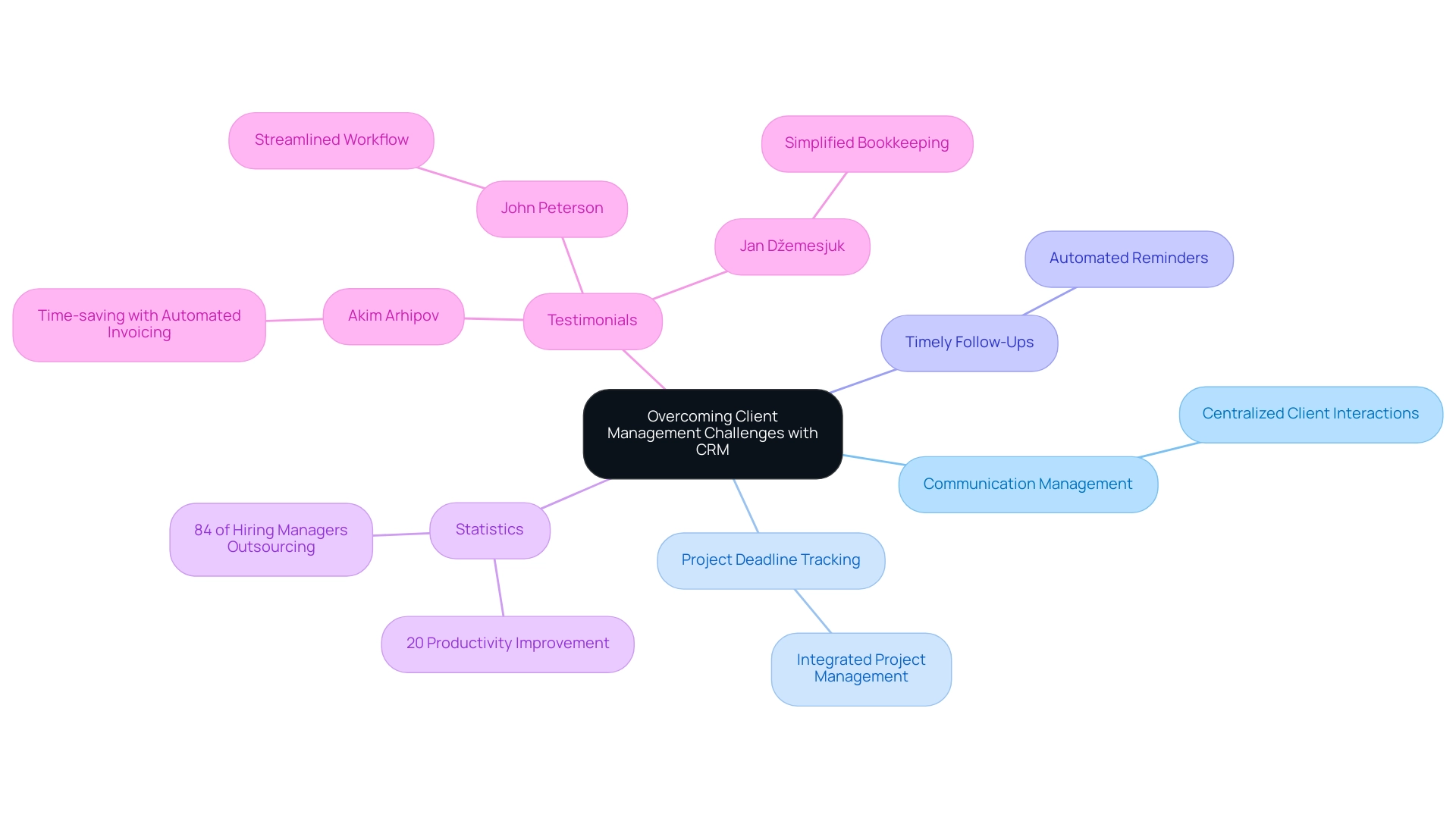
Ensuring Data Security and Privacy in Your CRM Solutions
Data security remains a significant concern for freelancers utilizing CRM software, particularly as they manage sensitive customer information. Projections indicate that by 2025, 1.57 billion individuals will be freelancing globally, and the freelance platform market is expected to reach $8.39 billion. This underscores the necessity for robust data protection measures now more than ever. Freelancers should prioritize selecting reputable CRM providers like Kulud, which exemplifies effective CRM software by offering an automated expense management solution tailored to their needs.
Kulud adheres to stringent data protection regulations related to CRM software, ensuring compliance and safeguarding customer data. To enhance data security, implementing strong access controls is essential. This includes:
- Utilizing multi-factor authentication
- Restricting access to sensitive information based on user roles
Furthermore, employing encryption for both data storage and transmission protects against unauthorized access and data breaches, which are increasingly prevalent in the digital landscape.
Kulud has successfully completed a Cloud Application Security Assessment (CASA) and has been validated by the App Defense Alliance (ADA), ensuring a high level of security for its users. Regularly updating passwords and educating oneself on the privacy policies of chosen CRM systems are also critical practices. Freelancers should ensure they understand how their data is handled and what measures are in place to protect it. By prioritizing these data security best practices, independent professionals can not only protect their clients' information but also build trust and foster long-term relationships, which is essential in understanding CRM software.
Moreover, several CRM providers, including Kulud, are leading the way in ensuring data privacy for independent workers. Kulud's features, such as:
- Automated categorization of expenses
- The ability to analyze previous emails for receipts
- The option to export reports in PDF format
These features streamline bookkeeping processes, allowing users to save time and focus on their core business activities. As Georgi Knyazhev, a freelancer, noted, "Instead of spending 3 hours each month searching for and collecting invoices for my companies in Estonia, I now spend just 5 minutes. It's a huge time saver." Additionally, Kulud offers affordable pricing, making it accessible for independent workers. By adopting these measures, freelancers can confidently navigate the complexities of CRM systems while concentrating on their core business activities.
Furthermore, with 95% of customers prioritizing high-quality support over quick responses, choosing a CRM provider like Kulud with reliable customer support is essential for addressing any data security concerns.
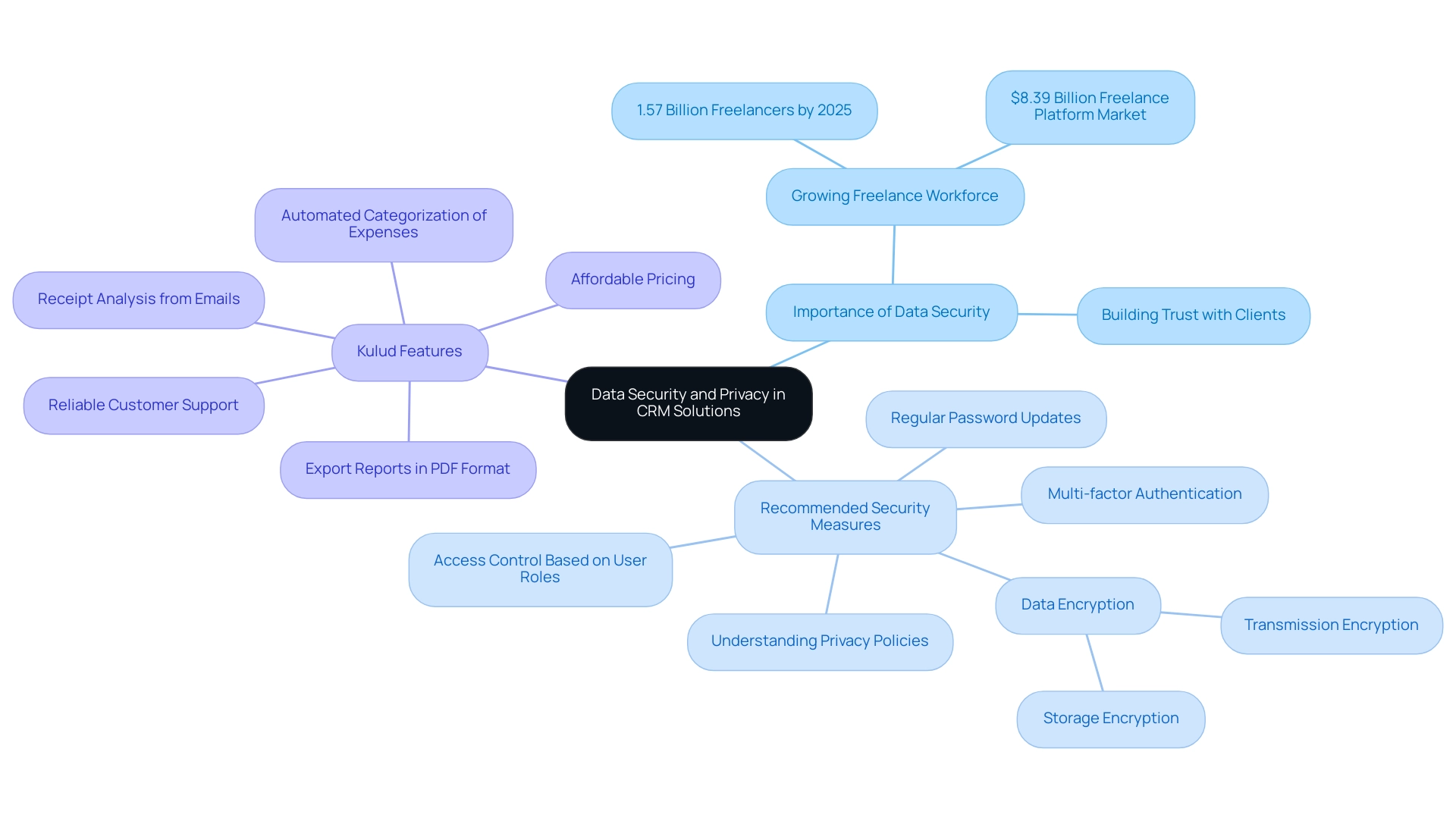
Conclusion
In the ever-evolving freelance landscape of 2025, the adoption of Customer Relationship Management (CRM) systems has become a pivotal factor for freelancers looking to enhance their client management processes. By centralizing client data and automating routine tasks, CRM solutions empower freelancers to concentrate on their core work, thereby improving both productivity and profitability. The integration of features such as task automation, email tracking, and seamless communication fosters stronger client relationships, ultimately driving business growth.
Freelancers now have access to a variety of CRM systems—operational, analytical, and collaborative—each designed to meet distinct needs. Selecting the appropriate CRM involves evaluating specific requirements and opting for user-friendly solutions that integrate smoothly with existing workflows. Best practices, including regular data updates and comprehensive training, are essential for maximizing the effectiveness of these systems.
Furthermore, as the freelance economy expands, the importance of data security cannot be overstated. Freelancers must prioritize choosing reputable CRM providers that adhere to stringent data protection regulations, ensuring the safety of sensitive client information. By implementing strong access controls and employing encryption measures, freelancers can build trust and foster long-term client relationships.
In conclusion, leveraging CRM technology is no longer a luxury for freelancers; it is a necessity for success in a competitive market. By embracing these tools and best practices, freelancers can streamline their operations, enhance client satisfaction, and ultimately achieve their professional goals. The future of freelance work is bright for those who harness the power of CRM systems to elevate their business practices.



